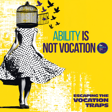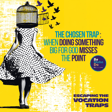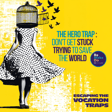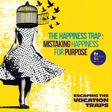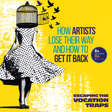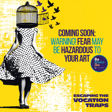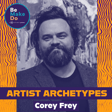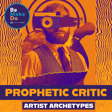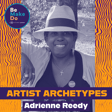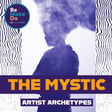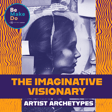Become a Creator today!Start creating today - Share your story with the world!
Start for free
00:00:00
00:00:01

Artist Archetypes: The Storyteller
Having a clear understanding of your motivations for creating allows you to stay focused and not get sidetracked by chasing success or fame.
In this episode of the Be. Make. Do. podcast, Lisa and Dan discuss The Storyteller Archetype focusing on why artists create and how understanding motivations can lead to fulfilling careers and a strong sense of identity and purpose.
The Maker, The Mystic, The Soul Healer, The Imaginative Visionary, The Prophetic Critic or the Storyteller? What's your archetype? Take the quiz here!
Stay in touch and share your thoughts:
TikTok: @bemakedopodcast
Instagram: @bemakedopodcast
Facebook: @bemakedopodcast
YouTube: @BeMakeDoPodcast
Transcript
Introduction to Be Make Do Podcast
00:00:11
Speaker
Hello, welcome to Be Make Do, a Soul Makers podcast where we talk about what it takes to pursue your calling with spiritual wholeness and creative freedom. I'm your host, Lisa Smith, here with my producer, Dan ABH. Hello, everyone. Hello, hello.
Exploring Artist Archetypes
00:00:26
Speaker
And we are in this wonderful conversation about archetypes, artist archetypes and motivation and thinking about why we create and why we do what we do.
00:00:40
Speaker
So we're looking at six different archetypes throughout the course of this season to help us think about um the unique pieces of who we are, why we do what we do, and look at that as a way to help us create our our careers and our choices um in a way that's fulfilling, that's spiritually fulfilling, that's fulfilling as a calling and not just chasing some idea of success or fame or path that we think we're supposed to be on. So that's where we are this season. We're having great conversations with artists and creatives about their motivations and their archetypes. If you'd like to find out what your archetype is, you can head over to soulmakers dot.org backslash quiz.
00:01:30
Speaker
Take the quiz and find out what your archetype is and then get in on the conversation with us as we explore each of the archetypes individually, thinking about our motivations, our challenges, and what we need to thrive.
Deep Dive into the Storyteller Archetype
00:01:43
Speaker
In our last series of conversations, we were talking about the imaginative visionary. so If you haven't had a chance to listen to those, you can go back and listen. and Today, we're going to get started with a new archetype, the storyteller.
00:01:56
Speaker
Not to be confused with a narrator. Oh, no. That's an inside joke. You have to listen to the first two episodes to get that one. All right. Let's get started.
00:02:16
Speaker
All right, so today we're going to talk about the storyteller archetype. Now, I want to say something before we dive in. And that is, again, we're not, this isn't a personality test. This is to define your archetype. And by that we mean we're looking at the things underlying, driving you to create.
00:02:40
Speaker
And it's just a tool. Again, we're not pegging somebody and putting them into a box and saying this is what you are. In fact, probably most everybody scores different percentages, like in a couple of categories. But the idea is to get us thinking. um Maybe you see yourself reflected in some of these motivations or the challenges.
00:03:01
Speaker
And by becoming aware of it, you're able to make better choices. So I just wanted to kind of say that right away, like there could be lots of different personalities who are storytellers or who are imaginative visionaries and an introvert versus an extrovert will look different. Right. Right. And that's where that's why I'm glad we're doing it this way and explaining it because people get so into this is my personality and this is who I am. Right. And that's not what we're saying. Yeah. We're trying to break down the motivation. Exactly, exactly. And open up a conversation and and just start thinking about it. So the storyteller is the next archetype that we're going to look at. And in some ways, they're similar to an imaginative visionary because they have this sense that art is a powerful means of of of of making an impact in the world, of connecting with people and
00:03:54
Speaker
um and bringing about change in a way. I think the one of the major differences between a storyteller and imaginative visionary is sort of the focus, the inward versus outward. The imaginative visionary is starting from a place, usually they're fascinated by the question, by the idea. And so they're creating things um to invite people into a conversation or into an experience because they want to explore the the ideas or the concepts.
00:04:24
Speaker
I think with a storyteller, there's much more of a connection to the person. To the people. Yeah, a desire to really um help other people have an aha moment, you know, see something they haven't seen before. view an audience almost. Exactly. Yes, it's very important that there is an audience, which makes a lot of sense, especially for people in the arts. um But i I think that that's there's this this um motivation. I think like what kind of gets you excited is the possibility of having somebody else
00:05:01
Speaker
become curious about something they weren't interested in before, or seeing something in a deeper way, or maybe discovering a deeper truth or seeing a part of themselves that they hadn't seen before. And that is a reward you know for for a storyteller, to be able to have something that they shared an audience member to feel like they've left changed in some way. Keeps them motivated and it fulfills them. Exactly. Yeah, yeah that that one-to-one connection. um So they are similar, I guess, to the imaginative visionary and the prophetic critic in that they have this sense of being able to see patterns and underlying principles and wanting to kind of bring that out through creative storytelling.
00:05:49
Speaker
um So, they often are also motivated by deeper um spiritual aspects or concerns in their life, um but they are maybe um
00:06:07
Speaker
ah motivated by a sense of play and of inviting other people into that as well. Right, right. And and when we were discussing the previous archetype, the imaginary visionary. Stop it. um Yeah, and i and this to t each of their own, but I really felt that really getting to know that archetype, that one just seems so like humbly spiritual AF, as I said in that episode.
00:06:34
Speaker
um as this one feels like there is a deep spiritual sense, but maybe it's not the entire package for this one. Yeah, I think i think being able to share new truths with other people, being able to um help people see each other yeah in a new way, so maybe almost as much facilitating an opportunity for other people to have those experiences, if that makes sense.
00:07:03
Speaker
Yeah. so that's that's I think in a nutshell, the major part of the motivation for the storyteller is oftentimes they have a story that they just want to get out or they want to help people be able to see things in a new way. Well, I'm always most interested in what the challenges are for each of these archetypes because I like to find weaknesses. okay I'm just joking. Well, it's not even
Challenges Faced by Storytellers
00:07:27
Speaker
a weakness. I mean, we all have these things that are challenges for us and we probably share most of them.
00:07:33
Speaker
But um kind of being aware of the areas that are most challenging for you can then help you create structures to support you in those places. And we obviously work within this framework of seven principles, and um that's kind of a lot of where we we look at these challenges and also the things that you need to to thrive.
00:07:54
Speaker
So, I think ah the storyteller is, I think, pretty strong actually with, so I'll start off with strengths and stuff. Yeah, let's do strengths. they're They're in a place where, um you know, relationships are probably a lot of times pretty easy for them because they enjoy connecting with other people.
00:08:12
Speaker
However, ah being able to find people who with whom you can be intimate and real and vulnerable, um where it's not just all about you trying to do something for or with or to the other person, but really inviting people into the deeper part of your life.
00:08:32
Speaker
um is probably an important thing. I think for the most part, they probably score high in proficiency in their craft. Being good at what they do is important because that's important to be able to tell the story effectively right to get the results that you want. So they're usually really good and spend a lot of time developing their craft. Whether we're talking about a writer, or a person in theater, or a filmmaker, or a narrative person, a performer. It just depends on how that kind of... Or a songwriter. I was gonna say. A musician. A songwriter, for sure. Yes, indeed. Absolutely. I had a lot of thoughts on this last night when I was preparing. Did you? I did, yeah. Like what? Well, sort of like I was thinking about all the vocations.
00:09:20
Speaker
um I don't know why I get stuck in that, but I always like to like, I, for me, I like to know what motivates people, but I also want to know if they're motivated by something, what is their vocation? Like what? You know, because they, you could have a musician and you could meet all six archetypes and I might know all six archetypes, but sometimes at first glance, I don't think of that. I just think like the first thing I thought of about Storyteller, I was like, yeah, a teacher.
00:09:50
Speaker
Okay, yeah, absolutely. But then as I dug more into it and took the quiz several times as we were testing, this was the one that I was most confused about.
00:10:02
Speaker
Okay. And yeah. So tell me, why were you confused? Because I didn't think that like a musician or I only thought like a writer or director or a teacher or something. Um, but as I dove more into it, I started to think about, um, incredible, incredible storytellers in a musical sense, yeah you know? And, and even like,
00:10:24
Speaker
Even like when I'm producing an album, and not every album, but there have been specific albums where I was really trying to tell a story, and especially with my band's debut album. like It was like, this is the theme, these are this these are the lyrics, here's the music, and then how to create that soundscape to have this narrative from track one to track 11 or track nine or whatever. yeah So I didn't really have that aha moment until basically last night when I was preparing for this. Yeah. with you Isn't that interesting? It makes me think both you and and my husband Jay, like you both produce music and thinking about um that desire to help
00:11:12
Speaker
that Let's call it a story. The story come to fruition. like you see Maybe you have all these different pieces, these different instruments that have played different parts. You have all these different parts. And different people involved in it. Yeah. And then you're putting all those pieces together and making it sound a particular way so that I think one of the things I see with both of you in this is that there's a real joy in helping all those different pieces then become one cohesive story, one sound that oftentimes surprises everybody who contributed. They're like, whoa, I didn't know that's what it sounded like. Yeah. The question for me is always what is the underlined themes of this? So if you said the theme is
00:12:01
Speaker
um adventure, trauma, and comedy. How do we tell that story in music production all the way through? yeah Because just because the song is different doesn't mean that the themes are any different. right or mean So how do you create those And I don't know why I came out with all three of those words, but um but yeah, like how do you do that? You have to be able to tell the story through your medium of vocation, yeah you know? yeah And you can hear it, or you can see it, or you can imagine it. you know so
00:12:35
Speaker
Yeah, so all of these archetypes exist within the different artistic disciplines. right So it's not like one particular writers are storytellers, right filmmakers are imaginative vision or whatever. You find all of all of these different archetypes within all of these different fields, which is why it's so important to dive deeper into this and think about this motivation because I let's say I'm a musician and you're a musician, but you're a storyteller and I'm a maker. And I think that the way to be a musician is to follow your path.
00:13:15
Speaker
But what happens is maybe I'm not really interested in what you're interested in music. I'm just interested in playing. I want to be the best pianist or or guitarist or xylophone player or whatever singer that I possibly can be. And I want to spend hours and hours doing that. right And I want to be in arenas that appreciate that that level of artistry. right um
00:13:47
Speaker
I may not spend as much time thinking about the story I don't necessarily want to write the music exactly i want to make the music and maybe if we were switched vice versa and it was just all about practice and virtuosity for you that might drive you crazy and.
00:14:04
Speaker
you know, make you want to give ah give up music because you you want it's really the music itself is it is a vehicle to a different kind of expression or a different kind of um piece of your calling. If that makes sense.
00:14:20
Speaker
It makes total sense. And I'm really happy that you actually use the example of music. um I'm sorry, we don't talk about musicians enough. We're going to do that more. We will, I promise. Well, going back to, well, not that we like kind of deep dive into that a little bit more.
00:14:38
Speaker
going back to some of those challenges. challenges yeah what What challenges are do does this archetype um face sometimes?
Balancing Risks and Spiritual Values
00:14:47
Speaker
Yeah. Well, ah there's one more um kind of area of strength, which is also creative risk-taking and action. I think, again, that comes with the sense of taking the time and energy to be good at what you do and then um be willing to do what it takes to get wherever it is you want to go. So those are great strengths, but um it's then very important to have a really strong sense of
00:15:19
Speaker
grounding in spiritual values and rhythms and practices that are going to keep you grounded along with a real sense of discipline self-knowledge, of having a really strong sense of identity um and knowing who you are and why you're dummy this is just exactly what we're talking about knowing why you're doing things so that you don't get wrapped up and caught up in chasing the next thing, right chasing success, um especially because or so as a storyteller, so connected with an audience to ah resist the temptation to allow external forces to determine whether or not I'm good enough. you know Sometimes when when we respond to an audience,
00:16:15
Speaker
ah You know, it can feel good when when we're doing well and people like us and we, you know, our our work is having success or good feedback or you're getting that, yeah, you're you're getting to see those aha moments. And then if it's not working out, identity can can suffer right a little bit. So that's where for all of us, it's the same thing to have this grounding in a sense of of identity and self knowledge, spiritual,
00:16:45
Speaker
practices, that sort of thing. I'd say the other thing that is important for storytellers to spend time in, um because they have such a strong sense of ideas and they can see how the pieces fit and they're interested in helping other people see what they see,
00:17:04
Speaker
It's really valuable to make sure that you are in relationships with or take time for self-reflection, that we're kind of spending time in developing humility to understand that we're not responsible for saving the world. We're not responsible for everybody else's experience of the world and that other people's experiences and thoughts are valid so spending time trying to understand other people's perspectives and being willing to explore things in new ways ourselves and allowing other people to help us to have aha experiences and seeing new things so i think those are some of the areas for challenger focus.
00:17:46
Speaker
All right, well, how about what the storyteller needs to thrive? What are what are some opportunities? Absolutely. ah Again, these are the same for everyone, really, these opportunities to thrive. And again, they go to our seven principles for soul makers. But, you know, kind of like there are certain ones that sort of shine out for each of these.
00:18:08
Speaker
I think being able to have a strong small group of peers is important. People who are ah going to be able to hold you accountable, but also be able to celebrate you and remind you you who you are. in the times when things are not going well, you know, that really strong. And maybe we're talking about one or two or three people. It doesn't have to be the huge group of people. But again, we have things like our spiritual collectives and there are other groups that you can be a part of. um I think especially with artists who really get what it's like to be um both really thinking spiritually and and creatively at the same time.
00:18:50
Speaker
And I think that goes into the developing rhythms for spiritual practices that just really work for you to make sure that you have regular habits and rituals that keep you grounded in um in your relationship with Christ and who you are are in that, that you are clear again about your motivations and what you're what you're doing in the world. I think those are the two things that are the most important for being able to hold on to a sense of identity and not giving in to self-doubt or needing to look externally for validation. Those people, those relationships with God, relationships with other people, I think are really, really important. So I'd say those are the the two major ones right for helping a storyteller to thrive. Those are like very highlighted. Yeah. Yeah. yeah Makes sense.
Upcoming Episode Teaser
00:19:44
Speaker
Next up, we'll be talking with Tammy Dixon of Brickolage Theatre Company in Pittsburgh, Pennsylvania. And she is absolutely a storyteller and has a wonderful perspective on life and creativity and developing your career as an artist. It's going to be a fantastic conversation. So make sure that you tune in next time. Thanks for listening.
00:20:08
Speaker
Thanks for listening to Be Make Do, a Soul Makers podcast. All links and resources are located in our show notes. Want to know your artist archetype? Take the quiz at soulmakers dot.org backslash quiz.
